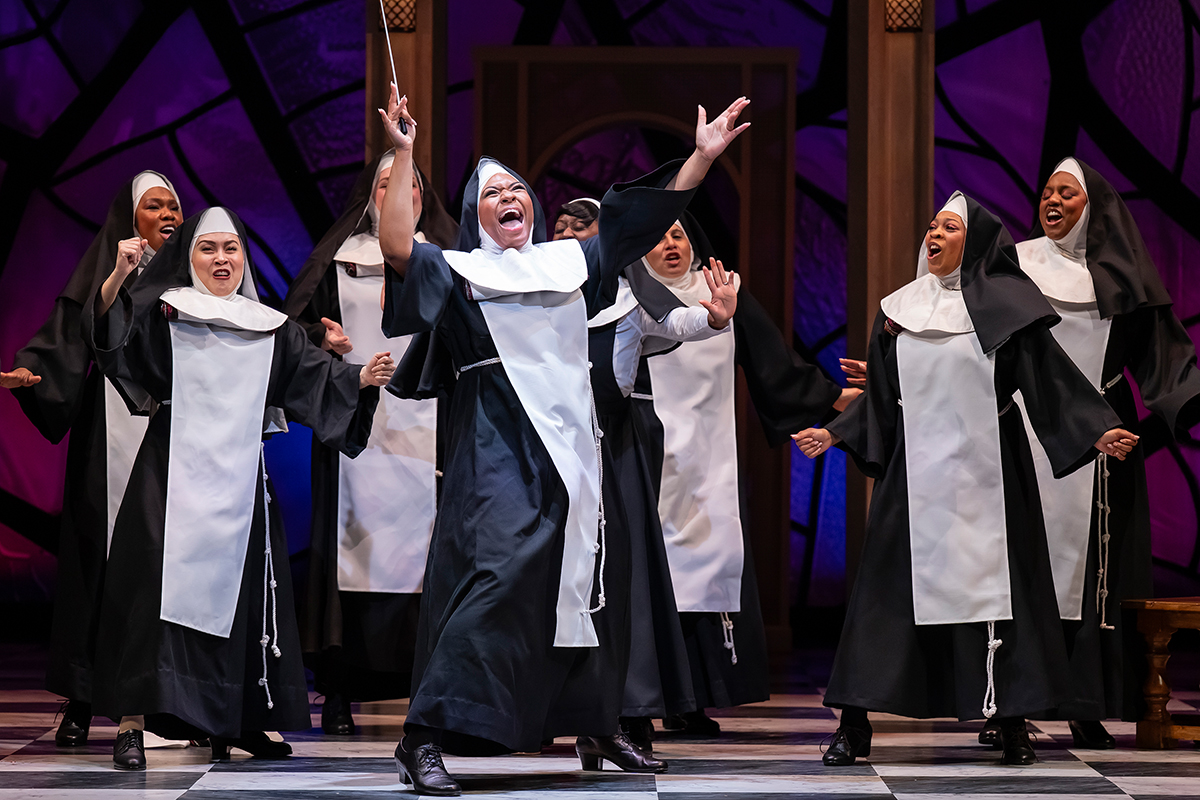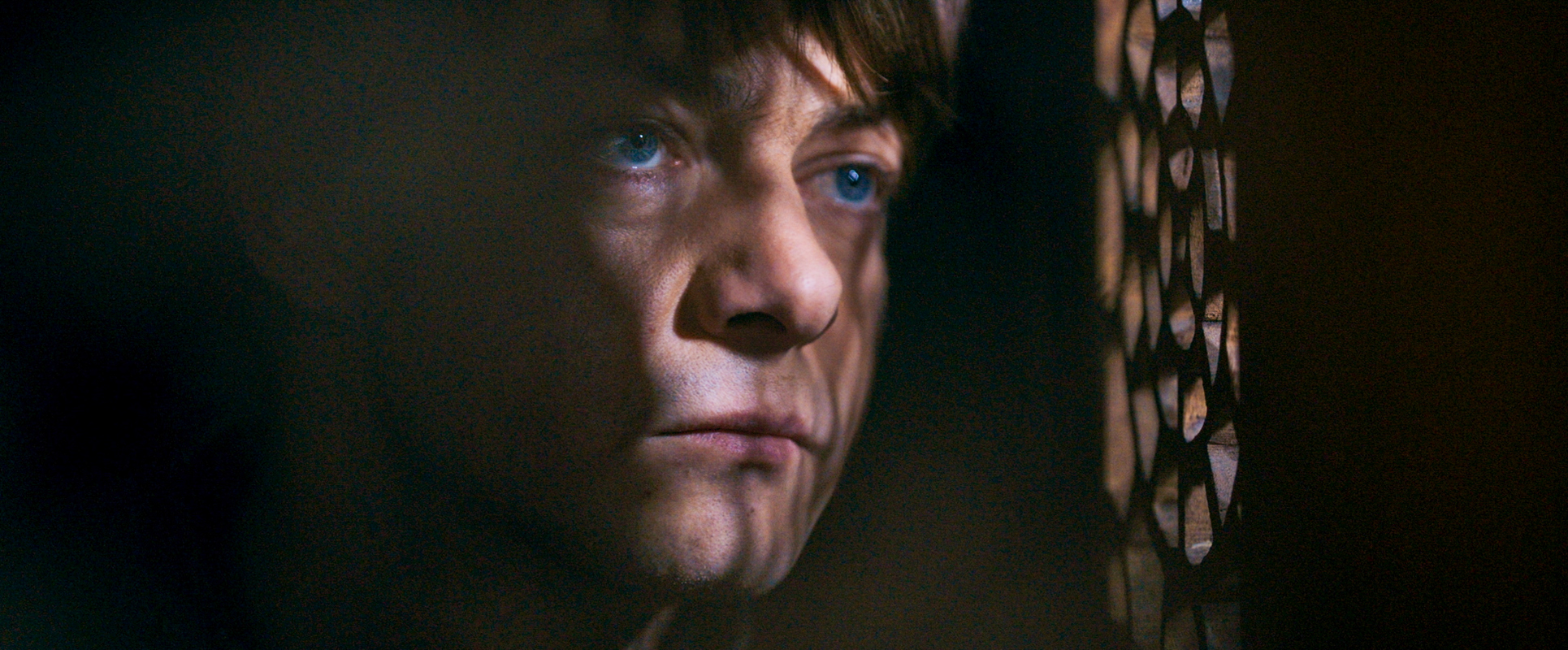‘The Hills of California’ is a Terrific Sister Act
A dramatic London import, The Hills of California, about shattered dreams drifts to Broadway with potency and poignancy.
By Ryan Leeds on October 20, 2024

“What happens to a dream deferred?” Langston Hughes asked in his famous poem, “Harlem.” Playwright Jez Butterworth shows us in his heartbreaking, epic play The Hills of California. Only here, dreams aren’t simply deferred. For the Webb sisters, they are stifled and stomped upon before they are even given wing.
In 1976 Blackpool London, three of the four sisters have gathered to discuss the impending death of their mother, Veronica (Laura Donnelly), days away from losing her battle with life. “Mother’s cancer, her primary cancer, is stomach cancer. A tumor. This particular tumor can be caused by years and years of stress and worry, stress brought on by any number of things,” Gloria (Leanne Best) explains to her siblings.
The intimation is clear: the number one reason is guilt. In their younger days, Veronica pushed the foursome towards performance stardom with an act akin to The Andrews Sisters.
Through a friendship forged by Veronica’s friend, Jack Larkin (Bryan Dick), the family is introduced to Luther St. John (David Wilson Barnes), an American talent scout whose clients include Perry Como and Nat King Cole.
Butterworth transports us back to 1955, and the three-act drama toggles back and forth between time periods. Yet by 1955, Big band and swing music was on its way out, making way for the hipper, cooler genre of rock and roll. Luther explains the problem but believes that only one of the sisters, Joan (Lara McDonnell) has the star quality he’s seeking.
As a grown adult, Joan (played in a dual role by Donnelly), now living in San Francisco, has to face the cruel reality that life did not unfold for her as she had hoped, and deal with the resentment towards an overbearing stage mother who forced her daughter into a traumatic situation that cannot be undone.
This explains why Joan hasn’t returned home to visit until now and has left Jill (Helena Wilson) shouldering the responsibilities of caregiving and maintaining the now defunct Seaview Hotel, where the action in the 1970s takes place.
Rob Howell has given this cast a massive set that comprises a mountain of steps, a once-festive tiki bar, complementing the hotel’s theme (although, ironically, guests have no view of the sea from the property), and a broken jukebox that mirrors the Webb family’s broken lives. Now grown, Gloria and Ruby (Ophelia Lovibond) have settled down with husbands and kids, but they still trudge through a consistent life of unfulfillment.
Family dynamics are catnip for playwrights, but too frequently, the writing is simply bad, with storylines predictable and overly melodramatic. Seasoned theatergoers should feel assured, however, that in Butterworth’s hands, this is family drama at its very best. Much like he did in 2017’s The Ferryman, Butterworth creates fully developed and dimensional characters who are continually compelling to watch.
Much credit can be given to director Sam Mendes, who brings a profound sense of realism. Not a false note exists in The Hills of California, making it all that more of an emotional ride. No doubt that the play, which transferred from London’s West End after a successful run earlier this year, will attract the attention and praise of Tony voters.
While the whole cast is pitch perfect, it is Donnelly who has the good fortune to portray both Veronica in the fifties flashback scenes and adult daughter Joan in the seventies. It’s truly impressive to watch her effortlessly glide between a Northern England accent and California American.
Butterworth reminds us of the frail nature of siblinghood. As children, we learn to innocently and genuinely connect and care for one another, but in adulthood, life can throw curves, resentments can fester, and devastating secrets can be revealed. We’re also reminded that all of our choices, for better or worse, become the sum of our parts.
The Hills of California is a rare treat. Running nearly three hours, it takes time to pick up steam, but once it does, it keeps audiences leaning in, eager to eavesdrop on this flawed but fascinating family.
The Hills of California (★★★★☆) plays through Dec. 22 at the Broadhurst Theatre, 235 West 44th St., on Broadway. Tickets are $58 to $351. Visit www.thehillsofcalifornia.com.
‘Sister Act’ at Ford’s is a Heavenly Good Time
Beloved characters, a committed cast, and fabulous musical numbers add up to a great time at Ford's Theatre's "Sister Act"
By André Hereford on March 29, 2025 @here4andre
Blessed with a sweet yet sturdy redemption story, Sister Act, based on the hit 1992 film starring Whoopi Goldberg, is a natural fit as a screen-to-stage musical.
The tale of lounge singer Deloris Van Cartier hiding out from her murderous crime boss boyfriend in the last place he'd think to look for her -- a convent full of singing nuns -- eagerly lends itself to set-pieces full of singing and dancing.
Composer Alan Menken and lyricist Glenn Slater's score of catchy original tunes are paired with a solid book by Cheri Steinkellner and Bill Steinkellner, and additional material by Douglas Carter Beane.
‘Kunene and the King’ Examines Apartheid from a Different Angle
Rich with human detail, "Kunene and the King" explores the terrible cost and legacy of South Africa's apartheid.
By Kate Wingfield on March 22, 2025
It can't be easy to write a play that successfully cries out to the world "Look what happened here! Understand!" Many fall way too hard on the side of over-explaining, feeding the drama with fiction-busting expository and presenting their characters as either heroes or villains to make every point crystal clear.
Their hearts may be in the right place, but they so woefully underestimate their audience that they lose it. The truth is, everyone who has made it to adulthood knows that life is messy and that even the "good guys" stumble and struggle. The plays that can deliver their message amid this human ambiguity are the powerhouses in this tradition, playwright Branden Jacobs-Jenkins being a prime example.
Gay French Thriller ‘Misericordia’ is Creepy and Suspenseful
Alain Guiraudie's queer thriller "Misericordia" subverts its simple domestic setup with secrets, lies, and hidden desire.
By André Hereford on April 13, 2025 @here4andre
Serene on the surface, seething with desire beneath, Alain Guiraudie's French thriller Misericordia is fascinatingly strange, creepy, and suspenseful.
Much as the filmmaker's masterful 2013 thriller Stranger by the Lake planted a sinister seed by setting a serial killer loose in a tranquil outdoor gay cruising spot, here Guiraudie upends a seemingly wholesome homecoming in the countryside with dark undercurrents of sex and violence.
Although, beyond a couple of pointed shots of male nudity and one shot of bleeding, there's little sex or violence onscreen. Merely the potential for the former and the threat of the latter linger equally over nearly every scene in this odd chamber piece set in a remote village tucked amid the forested hills of Occitanie in Southern France.
Support Metro Weekly’s Journalism
These are challenging times for news organizations. And yet it’s crucial we stay active and provide vital resources and information to both our local readers and the world. So won’t you please take a moment and consider supporting Metro Weekly with a membership? For as little as $5 a month, you can help ensure Metro Weekly magazine and MetroWeekly.com remain free, viable resources as we provide the best, most diverse, culturally-resonant LGBTQ coverage in both the D.C. region and around the world. Memberships come with exclusive perks and discounts, your own personal digital delivery of each week’s magazine (and an archive), access to our Member's Lounge when it launches this fall, and exclusive members-only items like Metro Weekly Membership Mugs and Tote Bags! Check out all our membership levels here and please join us today!
The Magazine
-
Most Popular
 Signature Honors Mandy Patinkin in Emotional Celebration
Signature Honors Mandy Patinkin in Emotional Celebration  Gay Army Reserve Officer in Uniform Sex Video Scandal
Gay Army Reserve Officer in Uniform Sex Video Scandal  Hugh Bonneville Talks 'Downton Abbey,' 'Paddington,' and 'Vanya'
Hugh Bonneville Talks 'Downton Abbey,' 'Paddington,' and 'Vanya'  Ex-Mormon Josiah Ryan Spreads Love as 'Gay Jesus' in Utah
Ex-Mormon Josiah Ryan Spreads Love as 'Gay Jesus' in Utah  A Potent (and Pricey) 'Good Night, And Good Luck'
A Potent (and Pricey) 'Good Night, And Good Luck'  Gallery: Blake Little's Breathtaking 'Construction Nudes'
Gallery: Blake Little's Breathtaking 'Construction Nudes'  'The Wedding Banquet' Remake Serves Laughter and Love
'The Wedding Banquet' Remake Serves Laughter and Love  Holly Twyford and Kate Eastwood Norris Shine in 'Bad Books'
Holly Twyford and Kate Eastwood Norris Shine in 'Bad Books'  MISTR's Free DoxyPEP Leads to Huge Drop in STI Rates
MISTR's Free DoxyPEP Leads to Huge Drop in STI Rates  'Gray Pride' Protests Hungary's Ban on Gay Pride Marches
'Gray Pride' Protests Hungary's Ban on Gay Pride Marches
 Hugh Bonneville Talks 'Downton Abbey,' 'Paddington,' and 'Vanya'
Hugh Bonneville Talks 'Downton Abbey,' 'Paddington,' and 'Vanya'  Holly Twyford and Kate Eastwood Norris Shine in 'Bad Books'
Holly Twyford and Kate Eastwood Norris Shine in 'Bad Books'  'The Wedding Banquet' Remake Serves Laughter and Love
'The Wedding Banquet' Remake Serves Laughter and Love  Ex-Mormon Josiah Ryan Spreads Love as 'Gay Jesus' in Utah
Ex-Mormon Josiah Ryan Spreads Love as 'Gay Jesus' in Utah  Gallery: Blake Little's Breathtaking 'Construction Nudes'
Gallery: Blake Little's Breathtaking 'Construction Nudes'  Becca Balint: The Pride of Vermont
Becca Balint: The Pride of Vermont  Signature Honors Mandy Patinkin in Emotional Celebration
Signature Honors Mandy Patinkin in Emotional Celebration  MISTR's Free DoxyPEP Leads to Huge Drop in STI Rates
MISTR's Free DoxyPEP Leads to Huge Drop in STI Rates  A Potent (and Pricey) 'Good Night, And Good Luck'
A Potent (and Pricey) 'Good Night, And Good Luck'  Sarah Snook is Astonishing in Broadway's 'Dorian Gray'
Sarah Snook is Astonishing in Broadway's 'Dorian Gray'
Scene
Metro Weekly
Washington's LGBTQ Magazine
P.O. Box 11559
Washington, DC 20008 (202) 638-6830
About Us pageFollow Us:
· Facebook
· Twitter
· Flipboard
· YouTube
· Instagram
· RSS News | RSS SceneArchives
Copyright ©2024 Jansi LLC.











You must be logged in to post a comment.